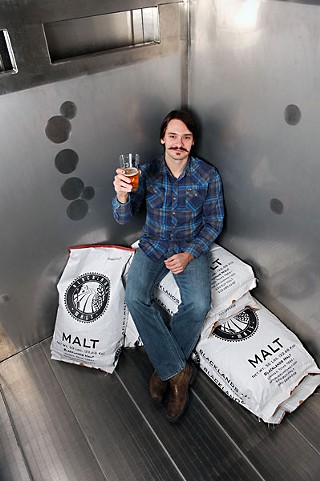Kernel to Cup
Blacklands Malt harnesses water, time, and fire to create the perfect beginnings for your beer
By Anna Toon, Fri., Jan. 24, 2014
A mustachioed gentleman and a pint-sized dog called Riker keep Texas' first and only malthouse in production. Brandon Ade, owner and operator of the Leander-based Blacklands Malt, spends his waking hours – and some sleeping hours, too – at the malthouse, occasionally catching a snooze on a well-worn couch tucked away in his office. Fueled by the ample consumption of coffee and coffee porter, all-nighters are routine for the maltster. Broken up into an hourly schedule spanning three shifts and 24 hours, the production cycle, as it turns out, waits for no man.
Named for the Texas Blackland Prairies – a fertile eco-region ideal for cultivation that extends from the Red River north of Dallas to San Antonio – Blacklands Malt is the brainchild of Ade, a 31-year-old former computer engineer from Indiana. After moving to Texas and working in the semiconductor industry for eight years, Ade began to experience the familiar dissatisfaction so many get after sitting behind a desk day after unending day. During beer-drinking sessions, Ade and his buddies frequently bandied around entrepreneurial ideas, but it wasn't until February of 2012 that Ade realized his passion. "As a homebrewer and craft beer junkie, I've always had an eye toward trying to get into the brewing industry in some way. I just woke up one day and had this idea of, 'Where does malt come from? Where does barley grow?' Right away, I realized, this is it, this is what I want to do in the brewing industry."
Soon after, Ade immersed himself in an intense crash course at the Canadian Malting Barley Technical Centre in Winnipeg. The course vaulted Ade from understanding little about basic malting to designing his own equipment (a custom two-ton system) and starting a malthouse. Fast forward to November 2013, and Ade opened Blacklands Malt with his wife, Samantha. Now after just two months, all of the pallets in the malthouse from the first production cycle are already either spoken for or sold: Homebrewers laid claim to half of the first batch while commercial breweries and brewpubs purchased the rest. Blacklands Malt has standard offerings available at different times of the year, including a White Horn Pilsner, Pale Moon North American 2 Row Base, Red Winter Wheat, and Cold Rock 20L Light Crystal. Additionally, Blacklands offers custom ordering including gluten-free products and raw grains. While Ade is still figuring out his relationships with distillers and breweries and not ready to disclose his coveted client list, Pinthouse Pizza quickly joined the ranks, brewing a pilot beer aptly coined "Blacklands SMaSH," for Single Malt Single Hop using Santiam hops and a neutral ale yeast. The second pilot batch of which (limited to 10 gallons) will be tapped at Pinthouse tonight (Thursday, Jan. 23) beginning at 5pm. Jester King Brewery – an avid supporter of locally produced and locally grown barley – was also among Blacklands' first customers. "Blacklands Malt is a good fit because making beer with a sense of place is something that's very important to us," said Jester King founder Jeffrey Stuffings. "We want our beer to be a reflection of the environment in which it's made, so we were immediately drawn to using barley and wheat grown and malted in Central Texas. In terms of sustainability, we're excited to support local agriculture and use ingredients that don't have to travel across oceans to get to us."
Malting basically consists of taking cereal grains like barley and wheat and putting them through a process that gets them ready for use in food and beverage. The idea is to grow the plant just a little bit to develop enzymes that convert starch to sugar and then halt the growth at a specific, desirable time. At that point the malted grain can be used for distilling, brewing, and food products. The malting process is necessary for brewing beer as raw grain lacks the natural enzymes necessary to convert starches to sugar.
The malting process takes water, time, and fire. Raw grain is first steeped in water. The kernel absorbs moisture, which triggers the growth process while continuing to take in water. The next step is germination, when the kernel is given time to develop enzymes for starch conversion and protein degradation. Finally, the growth of the kernel is halted with fire. The kernel is placed into a kiln until moisture content is reduced to around 5%. During the kilning, specific flavors and colors can be developed depending on the temperature of the kiln. After the kilning process, the malt is cooled, deculmed (a process that removes the dried rootlets), cleaned, packaged, and ready to be sold.
Right now, the majority of malt comes from huge conglomerations – macro-maltsters that supply the entire world's brewing needs. However, as Central Texas farmers replace acres of wheat with barley, growing and malting locally in Texas could represent a reinvigoration of a lost art. Not surprisingly, there's a great sense of pride wrapped up in where a beer is brewed, and specific geographic locations carry great weight in the hearts and palates of discerning imbibers. But the same amount of pride in the regionality of specific brewing ingredients isn't often as celebrated. This could soon change. As the average beer consumer is increasingly educated about what it means to drink local craft beer, the ingredients will gradually become more important to the same consumers. For Ade, it's also an integral part of a sustainable business model. "I believe [the malt] should be local, and I care about it, because why do we source it out of state or ship it overseas if we don't have to? If we can do it here locally, why not?" Though Blacklands Malt currently sources its barley from Colorado, Ade intends to eventually utilize 100% Texas-grown barley. "My whole vision and dream, you know, when I had the idea of malting was, 'Why aren't we growing barley in Texas and malting it here if it's possible?' You know, complete the whole local food cycle of growing it, malting it, brewing it, drinking it, and so forth," says Ade.
The Austin Food & Wine Alliance agreed. Out of 22 grant applications, AFWA awarded Blacklands Malts a $5,000 grant in support of local and sustainable craft beer production. According to AFWA, the grants chosen align with its mission to foster education, awareness, and innovation in the Central Texas food and wine community. "By providing the first locally grown and malted barley in the state, Blacklands Malt not only helps further innovation in Austin but provides a sustainable product for our craft brew community," said AFWA Executive Director Mariam Parker. Ade intends to use the grant for additional storage. While Ade is currently able to store 22 tons of barley, the grant will enable Ade to build a three-level warehouse-style racking system, increasing his storage capacity to 42 tons. With the facility to accommodate an additional 30 to 40 acres of barley production, Ade will be able to bring on an additional farmer.
Blacklands Malt faces unique challenges as the lone malthouse in Texas. The barley supply must be managed and well-thought-out months ahead of time. A barley shortage or crop failure could easily cut a micro-maltster, such as Ade, out of the equation. Then there's the manipulation of a living organism and the art of creating something both beautiful and with just the right flavor. Ultimately, Ade and the farmers the malthouse supports are at the mercy of Mother Nature. If Ade is lucky, perhaps she prefers her malts local.









